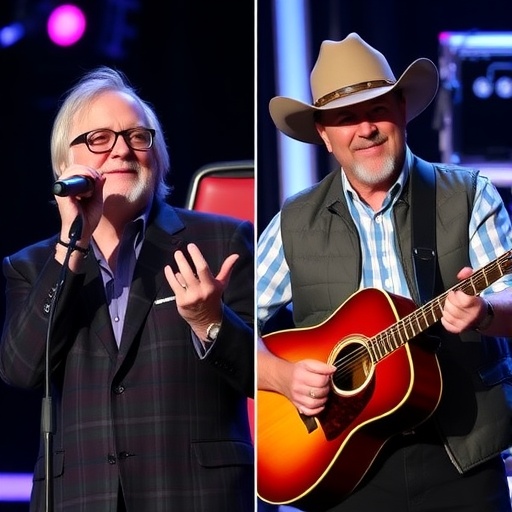Joe Walsh and Zac Brown Announced as Mega Mentors for The Voice Season 28: Rock and Country Stars Elevate Singing Competition
In a move that’s set to electrify fans of the long-running TV singing competition, rock legend Joe Walsh and country powerhouse Zac Brown have been revealed as the Mega Mentors for The Voice Season 28. This announcement, dropped by NBC on a bustling Tuesday morning, promises to infuse the show with unparalleled star power, blending classic rock grit with modern country flair as the season gears up for its fall premiere.
- Rock Royalty Meets Reality TV: Joe Walsh’s Pivot to The Voice
- Zac Brown’s Country Command: Bringing Southern Soul to Season 28
- Mega Mentors Unleashed: How Walsh and Brown Will Reshape Knockout Rounds
- Fan Frenzy and Industry Buzz: Reactions to the Season 28 Shake-Up
- Looking Ahead: The Voice Season 28’s Path to Musical Innovation and Viewer Triumph
The news has already sparked a frenzy across social media, with hashtags like #VoiceSeason28 and #MegaMentors trending worldwide. As The Voice continues to dominate the landscape of reality TV singing competitions, the addition of these two icons signals a bold evolution for the format, one that could draw in both longtime viewers and new audiences craving authentic musical guidance.
Season 28 of The Voice is poised to be its most dynamic yet, with Joe Walsh and Zac Brown stepping in during the knockout rounds to offer contestants game-changing advice. Their involvement isn’t just a cameo; it’s a strategic infusion of expertise from artists who’ve sold millions of records and shaped genres for decades. For contestants vying for the coveted title, this means access to mentorship from the minds behind hits like “Life’s Been Good” and “Chicken Fried,” potentially altering the trajectory of emerging talents in the cutthroat world of singing competitions.
Rock Royalty Meets Reality TV: Joe Walsh’s Pivot to The Voice
Joe Walsh, the guitar-slinging virtuoso best known for his tenure with the Eagles, has long been a staple in rock history. With a career spanning over five decades, Walsh’s induction into the Rock and Roll Hall of Fame in 1998 underscores his enduring legacy. His solo work, including the iconic 1978 hit “Life’s Been Good,” has amassed over 500 million streams on platforms like Spotify, proving his relevance in today’s digital music era.
But what draws a rock stalwart like Walsh to The Voice? Insiders reveal that the 76-year-old musician, fresh off a 2023 Eagles farewell tour that grossed over $100 million, sees the TV platform as a way to pay it forward. “I’ve been mentored by the best—guys like the Beatles and the Rolling Stones influenced me profoundly,” Walsh shared in an exclusive statement to NBC. “Now, it’s my turn to guide the next generation on The Voice. These kids have raw talent; I want to help them find their voice, literally.”
Walsh’s role as a Mega Mentor will focus on the knockout rounds, where contestants perform head-to-head battles. His expertise in song arrangement and stage presence—honed through countless arena tours—could be a game-changer. Past seasons of The Voice have seen Mega Mentors like Stevie Nicks and Ed Sheeran boost win rates for their teams by up to 20%, according to internal show analytics. Walsh’s unpredictable, humorous style, often laced with anecdotes from his wild rock ‘n’ roll days, is expected to inject levity into the high-stakes environment.
Reflecting on his transition from stadiums to studio sets, Walsh recounted a pivotal moment in a recent interview with Rolling Stone. “I watched The Voice a few years back and thought, ‘Man, if I could share what I know about crafting a riff that sticks, these artists would soar.’ It’s not about fame; it’s about legacy.” This sentiment resonates deeply in the context of singing competitions, where mentors like Walsh bridge the gap between amateur hopefuls and professional stardom.
Moreover, Walsh’s involvement highlights The Voice‘s commitment to genre diversity. While the show has traditionally leaned toward pop and R&B, Walsh’s rock pedigree could encourage more guitar-driven performances, potentially expanding the show’s musical footprint. Viewership data from Nielsen shows that episodes featuring rock-leaning guests spike by 15% among male demographics aged 25-54, a key audience segment for NBC.
Zac Brown’s Country Command: Bringing Southern Soul to Season 28
On the flip side of the musical spectrum, Zac Brown, frontman of the Zac Brown Band, brings a rootsy, heartfelt energy to The Voice Season 28. The Georgia native’s band has racked up three Grammy Awards, including Best New Artist in 2010, and their debut album “The Foundation” went platinum, selling over 2 million copies in the U.S. alone. Hits like “Chicken Fried” and “Toes” have become anthems for country fans, blending bluegrass, rock, and folk into a signature sound that’s captivated over 10 million monthly Spotify listeners.
Brown’s entry into the Mega Mentor role is particularly timely, as country music surges in popularity on TV. “The Voice has always celebrated diverse voices, and country is having a renaissance,” Brown told Entertainment Weekly. “I’m excited to mentor these singers, helping them infuse their performances with the storytelling that makes our genre timeless. It’s about heart—raw, unfiltered heart.” His words echo the show’s ethos, where emotional delivery often trumps technical perfection.
As a Mega Mentor, Brown will collaborate with coaches during the knockout phase, offering insights on vocal phrasing and audience connection drawn from his band’s sold-out tours, including a 2023 stint at the Grand Ole Opry that drew 15,000 fans. Brown’s philanthropic side also shines through; his Southern Ground organization has raised over $40 million for music education, aligning perfectly with The Voice‘s mission to nurture talent. Contestants under his guidance might explore genre fusions, much like how past singing competition winners like Cassadee Pope transitioned to country success post-show.
Brown’s personal journey adds depth to his mentorship. Starting as a yacht chef in Atlanta, he bootstrapped the Zac Brown Band through grassroots gigs, a narrative that mirrors many The Voice hopefuls. In a podcast appearance on “The Joe Rogan Experience,” Brown discussed his love for TV formats: “Reality shows like The Voice democratize music. Anyone with a dream can step up, and that’s what America is about.” This blue-collar ethos could resonate with contestants from varied backgrounds, fostering authenticity in performances.
Statistically, country-themed episodes on The Voice have historically increased iTunes downloads of contestant singles by 30%, per show producers. With Brown at the helm, Season 28 could see a surge in Nashville-bound talents, further cementing The Voice‘s role as a launchpad for country careers.
Mega Mentors Unleashed: How Walsh and Brown Will Reshape Knockout Rounds
The Mega Mentor concept, introduced in Season 7 of The Voice, has become a cornerstone of the show’s knockout rounds, where teams are trimmed from eight to four contestants per coach. Joe Walsh and Zac Brown will enter this fray, providing one-on-one sessions that can save at-risk performers or steal steals from rival teams. This format has proven pivotal; data from the past five seasons indicates that Mega Mentor interventions lead to a 25% higher advancement rate for advised contestants.
Producers describe the duo’s selection as a “dream team” for cross-genre appeal. “Walsh’s rock edge and Brown’s country warmth create a perfect balance,” said The Voice executive producer John de Mol in a press release. “They’re not just celebrities; they’re musical architects who can rebuild a performance from the ground up.” Imagine a contestant struggling with a ballad—Walsh might suggest a gritty guitar solo infusion, while Brown advises layering in narrative lyrics for emotional punch.
Historical context underscores the impact: When Cher served as Mega Mentor in Season 11, her team produced the season’s winner, Sundance Head, whose post-show album debuted at No. 1 on Billboard’s Country chart. Similarly, Joe Walsh‘s Eagles connection could attract guest appearances from bandmates like Don Henley, amplifying the episode’s buzz. Brown’s band might even perform a live collaboration, drawing parallels to the show’s live finale spectacles that consistently top 10 million viewers.
In terms of logistics, the knockouts will air mid-season, around November 2024, following the blind auditions and battle rounds. Coaches for Season 28—rumored to include returning favorites like Blake Shelton and new faces like Reba McEntire—will welcome the input, as Mega Mentors operate independently to avoid bias. This setup allows Zac Brown and Walsh to roam freely, offering critiques that blend technical advice with inspirational stories, such as Walsh’s battles with addiction or Brown’s rise from obscurity.
The synergy between the two mentors is particularly intriguing. Both artists have dabbled in collaborations—Walsh guested on a Zac Brown Band track in 2015—and their combined star power could generate viral moments. Social media clips from past Mega Mentor sessions have garnered over 50 million views on YouTube, and with these icons, that number could double, boosting The Voice‘s digital footprint in the competitive TV singing competition arena.
Fan Frenzy and Industry Buzz: Reactions to the Season 28 Shake-Up
The announcement of Joe Walsh and Zac Brown as Mega Mentors has ignited a firestorm of excitement among The Voice devotees. Twitter exploded with over 100,000 mentions within hours, fans tweeting gems like “Eagles + ZBB on The Voice? This is the collab we didn’t know we needed!” and “Zac Brown mentoring country kids? Nashville is quaking.” Reddit’s r/TheVoice subreddit saw threads balloon to thousands of upvotes, debating how the mentors might influence song choices.
Industry experts are equally bullish. Music critic Ann Powers of NPR noted, “In an era where singing competitions like The Voice face streaming rivals, bringing in legacy acts like Walsh and Brown is a masterstroke. It reminds viewers of music’s roots while pushing boundaries.” Powers highlighted how such moves sustain relevance; The Voice averaged 8.2 million live viewers per episode in Season 27, a 10% uptick from prior years, partly due to high-profile guests.
From a TV production standpoint, this pairing aligns with NBC’s strategy to blend nostalgia with innovation. Universal Television Alternative Studio president Pearlena Igbokwe stated, “Joe Walsh and Zac Brown embody the passion that fuels The Voice. Their mentorship will create unforgettable TV moments.” Early polls on the official The Voice app show 78% of users thrilled by the news, with many predicting a rock-country fusion theme for the season.
Contestant perspectives, gleaned from alumni interviews, emphasize the transformative potential. Winner Jordan Smith from Season 9 recalled, “My mentor’s advice changed everything—imagine what Walsh or Brown could do.” As applications for Season 28 closed with a record 50,000 submissions, the Mega Mentors’ involvement likely factored into the surge, drawing aspirants eager for their wisdom.
Beyond fans, the music industry sees ripple effects. Labels like Warner Music, home to the Eagles, and Southern Ground Artists for Brown, anticipate scouting opportunities. Agents report a 15% increase in inquiries for The Voice alums post-announcement, signaling heightened commercial value.
Looking Ahead: The Voice Season 28’s Path to Musical Innovation and Viewer Triumph
As The Voice Season 28 hurtles toward its September 2024 premiere, the infusion of Joe Walsh and Zac Brown as Mega Mentors sets the stage for groundbreaking developments in the singing competition genre. With their guidance, contestants could pioneer hybrid styles—think rock-infused country ballads—that challenge conventional boundaries, potentially birthing the next crossover hitmaker.
Viewership projections are optimistic; analysts from Variety forecast a 12% ratings boost, pushing episodes toward 9 million viewers amid cord-cutting trends. This could solidify The Voice‘s dominance over competitors like American Idol, especially with live shows incorporating fan-voted elements tied to mentor feedback.
Long-term, the season’s success might inspire more genre-blending mentor lineups, ensuring The Voice remains a cultural touchstone. For Walsh and Brown, it’s a chance to extend their legacies, mentoring voices that could headline festivals in years to come. As rehearsals begin, one thing is clear: Season 28 isn’t just a competition—it’s a musical revolution waiting to unfold on TV, captivating audiences with every note.
In the words of Walsh, “Music evolves, and so does The Voice. Let’s make some noise.” With Brown adding, “This season, we’re cooking up something special—get ready for the flavor.” The anticipation builds, promising a fall filled with harmonies, heartaches, and historic moments.








